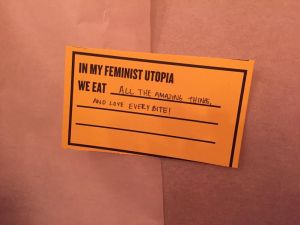I get away with things because I write. An ability to write well is power — to lead social change, to challenge assumptions and disrupt the status quo, and to validate your own feelings when other people won’t.
Writing is important to the feminist project for several additional reasons. Historically, writing has provided an outlet for women and marginalized people who had talent but were not eligible for other public roles because discrimination — and to an extent that continues today.
Writing is a way to share experience and theory, imagine alternate realities, and learn from one another. I’ve been saying for years that I believe it’s a radical act each time a woman tells the truth about her own life. Often those radical acts feel more comfortable in written form.
Recently I attended a networking event where a young woman shared that she wasn’t sure what she wanted to do after college. I asked about her interests and she said she liked to write. I encouraged her to keep pushing herself in her writing ability — it would serve her well no matter where life took her.
In that spirit, I’m offering my tips for how to be a better writer:
Read. Read books, newspapers, magazines, blogs, lyrics, Tweets, manuals. Read promiscuously. Read outside your ideology. Challenge yourself — I read Ulysses at the gym, sob — and enjoy your teen lit without shame. Buy women authors, because feminism. Just read.
Write. The way to be a writer is to write. If you say that you want to be a writer, you’re either procrastinating or speculating. Anybody who sits the fuck down and writes is a writer. The way to become a better writer is to keep writing.
Give yourself permission to be yourself. This is at least as much life hack as writing tip, but don’t try to be other people/writers! Do not worry that you do not have their perspective! You have your perspective. It matters and you deserve to share it.
Identify your narrative arc. It can be helpful to crystallize in your mind what drives your writing. Over a decade ago I realized that one of my chief aims as a writer is to expose uncomfortable truth. I believe acknowledging things we’re not supposed to talk about takes power from oppressive systems and redistributes it to individuals. Plus honesty feels great and helps me sleep. Not all of my work fits in the uncomfortable truth category, but I do find it helpful to remind myself why I do this work. In a few words, why are you doing yours?
Do not try to sound smart. If you’re writing to be understood by smart people, you’re lost on the side of a bad road. Make it excruciatingly easy for people to understand what you’re writing. Save the fancy words for standardized tests. (You’re still taking those? I’m sorry.) Do not assume people know the basics of your topic. Organize. Clear, concise, thorough — you win.
Most descriptive language should go away. Adjectives and adverbs mostly dilute meaning. For that matter, be ruthless in cutting words from your drafts. Say what you mean, and say it with fewer words.
Find your weaknesses. One year I resolved to stop using the word “just,” which was all over my speaking and writing. Are you awkward with commas? Identify your crutches and work on them. Which brings me to my next point:
Invent challenges for yourself. I’ve done so many fun things over the years to keep my writing fresh. Poem-A-Day competitions with friends, National Novel Writing Month. Trying to write a screenplay (holy fail). But the best challenges I invented to directly attacked my weaknesses. For instance, I recognized that in my fiction, my characters sucked. So I took a whole month where I forced myself to write a new character every day. Some days it took the form of a poem, an article, a press release, a speech, a flip book, or more often a short story.
Dabble in other kinds of writing. I’ve taken spoken word poetry classes, fiction writing classes, and workshops on placing columns. Getting out of your lane strengthens your voice in your primary writing arena. It shakes up your thinking and it’s fun.
Find editors who hate you. Actually please don’t seek out anyone who hates you. But the good editors are the ones who will challenge you to make revisions that make you roll your eyes in irritation. I have learned the most about writing from people who redlined me to tears.
Laugh at your old writing, and celebrate your resilience. I have successfully completed one novel, and that’s the only successful thing about it. It’s so bad I want to present myself to the jail a few miles away to show I’m sorry. I read grandiose things I used to write and cringe. I’ll probably read this post next week and do the same. Life is growth. Keep moving. Thank goodness.
Keep at it, and encourage others to do the same. I was in love with someone who showed me his writing. It was so bad! (To be clear, I’ve loved folks who showed me writing that was intimidatingly good, so please give yourself the benefit of the doubt in the event you’re an ex-lover perusing the blogs I am now writing, at age 35, late on a Friday night.) Yet he was so vulnerable. I didn’t know what to do, so I encouraged him on the few good parts of what he was doing. He actually got a lot better.
We should be so gentle with ourselves. Treat yourself like someone you love — encourage the areas that really work, and turn off the critic that focuses on the shit surrounding it. Coax the good stuff out and rely on what you learn from people who edit you to prune the rest.
Keep writing and you will get better.



